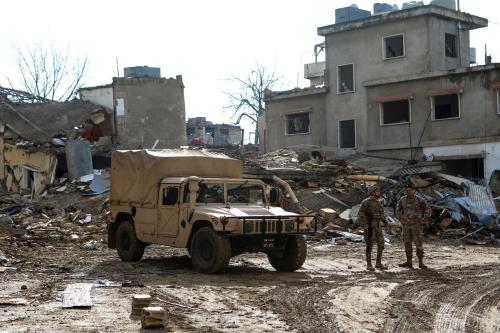The U.S. military, U.S. intelligence, and the Bush administration deserve a hearty cheer for the airstrike that killed Abu Musab al-Zarqawi. The guerrilla and terrorist leader was responsible for some of the most horrific acts of a brutal war, such as personally beheading American hostage Nicholas Berg; masterminding the strike on the U.N. headquarters in Baghdad; and orchestrating the bombing of three hotels in Jordan, including one in which a wedding was being held. In addition to these terrorist atrocities, Zarqawi was also al-Qaida’s point man in Iraq, a leader in the campaign to disrupt democratic elections, and one of the fiercest proponents of sectarian war. His screeds against Shiites drew reprimands even from fellow militants such as Osama Bin Laden’s deputy, Ayman al-Zawahiri.
Zarqawi was the symbol of the anti-U.S. insurgency—which other insurgent leader can most Americans name?—and his killing sends a message to the insurgents and to al-Qaida that the United States remains a potent enemy. It also tells Americans that day-to-day victories still occur in Iraq despite the many setbacks that dominate the headlines. Most important, Zarqawi was a major force behind the growing civil war in Iraq. His removal will not usher in an era of sectarian harmony, but his survival made that prospect far more difficult.
Still, the history of killing terrorist and insurgent leaders suggests that we must be cautious before declaring the death of any leader to be decisive. In 1992, Israel killed Abbas al-Musawi, the secretary-general of the Lebanese Hezbollah, to much self-congratulation. Although Musawi was a determined and capable leader, his successor, Hassan Nasrallah, has proved to be one of the most effective terrorist and guerrilla leaders in history.
Many Iraqis, including many hostile to the United States, did not see Zarqawi as their leader. Zarqawi was a vicious thug who lacked the religious credentials of Hamas’ Sheik Ahmad Yassin, or the panache of the Popular Front for the Liberation of Palestine’s Leila Khaled. The beheadings and other barbarous acts he conducted outraged many Sunni Arabs. Even by the standards of al-Qaida, Zarqawi’s interpretation of Islam was intolerant. His criticism of religious scholars who were insufficiently supportive, violence against Iraqis who violated his call to boycott elections, and general unwillingness to accept what he saw as deviance alienated many potential allies, including those among Iraq’s Sunnis who shared his other goals of ensuring Sunni dominance and expelling the United States from Iraq. Zarqawi also hogged the limelight. Despite recommendations from Zawahiri that he ensure that the insurgency have an Iraqi face, Zarqawi regularly issued statements that implicitly glorified his own role at the expense of local fighters. Not surprisingly, he was never able to unify the Sunnis of Iraq, let alone other Iraqis. As a result, today the Sunni insurgents often do not work together and at times even fight among themselves.
A new jihadist leader might succeed in uniting the insurgency more effectively. Such a leader could eschew the sectarian vitriol Zarqawi regularly spouted. He might be an Iraqi, making him better able to bring together the strands of jihadism and nationalism. And unlike Zarqawi, who also actively plotted attacks outside Iraq, a new leader may focus the struggle on targets within the country.
Nor does the structure of the Iraqi insurgency suggest that the killing will have a lasting impact. When Israel killed the leader of Palestinian Islamic Jihad, Fathi Shiqaqi, in 1995, it paralyzed the organization. Shiqaqi had led a highly hierarchical organization, and his successors squabbled for years over leadership and next steps. The Iraqi insurgency, in contrast, is highly decentralized, and the loss of any individual leader will not shut down most of the fighters because they are not waiting for their commanders to tell them where and when to strike. (It also means that, like Zarqawi, any new leader will exercise at best limited control of the overall movement.)
The removal of leaders can also have dangerous unexpected consequences. U.S. officials thought that the capture of Saddam Hussein would deal a major blow to the Iraqi insurgency, which they believed was led by former Baathists with close ties to the Iraqi dictator. In fact, his capture on Dec. 14, 2003, removed a stigma under which many insurgents operated: No longer were they seen as fighting to restore a brutal dictatorship but rather to liberate Iraq from the United States.
Despite these concerns, we should celebrate the death of a truly evil man. But as we do, we must remember that the problems the United States faces in Iraq go well beyond one person.
The Brookings Institution is committed to quality, independence, and impact.
We are supported by a diverse array of funders. In line with our values and policies, each Brookings publication represents the sole views of its author(s).



Commentary
Op-edWhat Zarqawi’s Death Means for the Insurgency
June 8, 2006